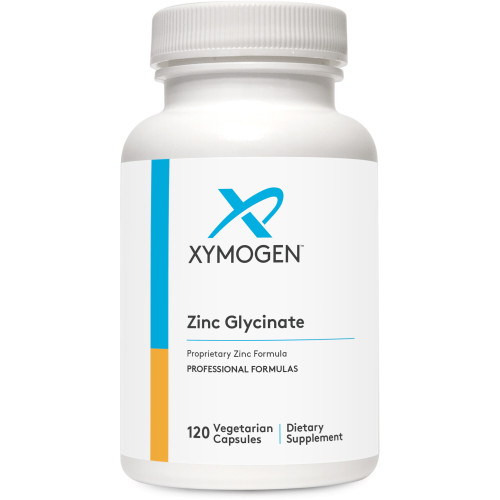
Product Description
About Zinc Glycinate
Zinc Glycinate is a Xymogen formula specifically created using a proprietary blend of amino acid chelate. The fully reacted Albion TRAACS chelate contributes to an enhancement of zinc absorption. Formulated to boost immunity and improve enzymatic reactions and protein metabolism, Zinc Glycinate ultimately supports the neurological and immune functions while also fostering reproductive health, the normal metabolism of nutrients, taste acuity, and growth.
How Zinc Glycinate Works
Zinc Glycinate is a zinc source featuring an exceptionally high potency for maximum zinc absorption. To achieve this, zinc has been coupled with two glycine molecules that help ease its absorption across the intestinal wall. At the same time, the formula also reduces the interference from both competing minerals and phytates.
Zinc’s Catalytic Role in the Bodily Functions
Being an essential trace mineral, zinc plays a fundamental role in several regulatory, structural, and catalytic functions in the body. It is widely known already that at least 300 enzymes rely on zinc for their healthy activities in the metabolism of the cells.
That aside, zinc is also a cofactor that takes an active role in the metabolism of protein and carbohydrates, along with the antioxidant activity of CuZnSOD (copper-zinc superoxide dismutase). When referring to improving immunity and the function of the immune system, zinc helps regulate interleukin, CD4 cells, natural killer cells, and T lymphocytes. In fact, according to recent research, supplementing with zinc is found to reduce the mortality and morbidity of apparently well-nourished kids considerably. Simultaneously, It can cut the recovery time from acute health issues.
Finally, zinc is found in high concentrations in the nails, hair, skin, sperm, prostate gland, eyes, muscles, bone, kidneys, pancreas, and liver. It is also required for fetal development and sperm maturation while also enabling the endocrine system to regulate the activity of insulin and the conversion of T4 (thyroxine) to T3 (triiodothyronine, an active thyroid hormone). And let’s not forget zinc’s influence in the expression of genes, the impulse transmission of nerve signals, as well as normal apoptosis and cell signaling.
Zinc and Protein Metabolism
Protein metabolism is closely associated with a wide range of functions in the human body, all of which are tied to the presence of zinc. In reality, zinc has a major contribution to the normal:
(1) Development and growth during pregnancy, adolescence, and childhood.
(2) Inflammatory response
(3) DNA synthesis
(4) Wound healing
Zinc also:
Contributes to the maintenance of cell membrane integrity – This is achieved by protecting them from oxidative damage and aiding in their normal function. Also, current research has shown that zinc supplementation in human subjects belonging to different age groups has reduced oxidative stress markers. Besides, supplementing with zinc is found to support a normal inflammatory response while playing a key role in the balanced TH1 and TH2 immune activity. On top of that, mucous and skin membranes rely on zinc to maintain their functions and integrity.
Contributes to the synthesis of retinol-binding protein – There seems to be a strong connection between Vitamin A and zinc when it comes to the synthesis of the protein that sends vitamin A into the blood. This retinol-binding protein needs zinc to help support the primary role of Vitamin A in night vision. All that aside, zinc is also a key player in the production of an enzyme that helps convert vitamin A into another active form. However, zinc’s role is not limited to night vision. It also enhances sensory perception in several other ways, including smell acuity and normal taste.
Factors That Interfere With Zinc Absorption
It is critical to ensure that daily zinc absorption and intake is achieved since the body cannot store zinc. Also, elements found in high-fiber foods of plant origin (aka phytates) can bind to zinc and other minerals and prevent or reduce their absorption. This means that the bioavailability of dietary zinc could be significantly reduced. Besides phytates, copper, calcium, and other minerals can also block the body’s ability to absorb zinc. And, we should also take into account the loss of zinc that takes place in the urinary and gastrointestinal systems. With no specialized system for zinc storage, it is paramount that we consider not only the zinc intake but also its retention and absorption. This requires an overall zinc status assessment.
How to Take Zinc Glycinate
The recommended dosage is one capsule a day unless otherwise instructed by the healthcare professional.
Always consult a healthcare practitioner before taking any supplement, especially if you are taking medications or are pregnant or lactating.
Zinc Glycinate Ingredients:
Supplement Facts
Serving Size: 1 Capsule
Servings Per Container: 120
| Amount Per Serving | % Daily Value | |
|---|---|---|
| Zinc (as TRAACS zinc bisglycinate chelate) | 20 mg | 182% |
* Percent Daily Values are based on a 2,000 calorie diet.
The formula contains NO:
Artificial preservatives
Artificial sweeteners
Artificial colors
GMOs
Eggs
Tree nuts
Peanuts
Shellfish
Fish
Dairy products
Animal products
Soy
Yeast
Corn
Gluten
Wheat
About the Manufacturer
Xymogen is a family-owned manufacturer of supreme quality dietary supplements. The health sciences company creates innovative formulas specifically provided to healthcare professionals exclusively.
Some of the best-selling Xymogen products are multi-vitamin ActivEssentials, relaxation-promoting 5-HTP CR, cardiovascular health-supporting Berberine, gastrointestinal-protecting GI Protect, and thyroid-protecting T-150.













